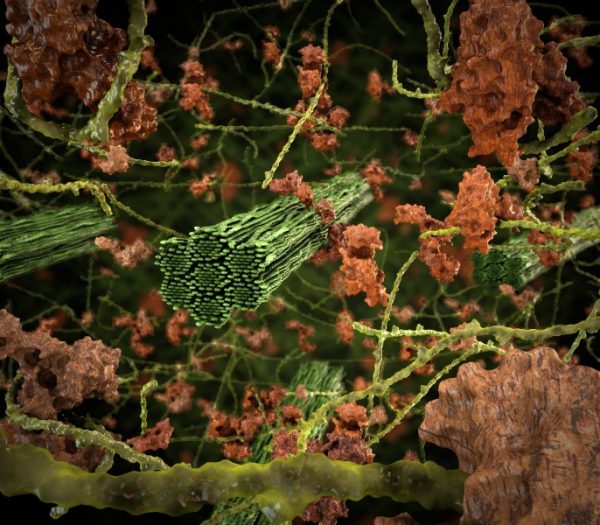
Oak Ridge National Laboratory’s Jeremy Smith is studying the recalcitrance of biomass to enable cheaper, more efficient biofuels, and other high-value chemicals. (Image courtesy ORNL)
Seven researchers from the U.S. Department of Energy’s Oak Ridge National Laboratory have been chosen by the Innovative and Novel Computational Impact on Theory and Experiment, also known as INCITE, program to lead scientific investigations that require the nation’s most powerful computers, a press release said.
INCITE awards computing time via a proposal process to researchers seeking to harness the power of DOE computing systems at the Argonne and Oak Ridge Leadership Computing Facilities to solve some of the world’s greatest scientific challenges, the press release said.
Since INCITE’s inception in 2004, the ALCF and OLCF have continuously undergone significant upgrades to retain their edge in facilitating the most computationally demanding scientific projects. The ALCF’s most recent machine is Theta, an 11.69-petaflop Cray XC40 system whose 280,000-plus cores make it ideal for research at the nexus of simulation, data science, and machine learning. An even more powerful system, the exascale Aurora, is planned for deployment in 2021 and is projected to be capable of a quintillion (one billion billion) calculations per second.
The OLCF, meanwhile, boasts the 27-petaflop Titan supercomputer, a Cray XK7 hybrid system powered by both CPUs and GPUs across nearly 19,000 nodes. Most importantly, beginning in January 2019, OLCF’s new 200-petaflop supercomputer, Summit, an IBM AC922 machine, will be available to users for the first time during this INCITE allocation cycle.
The ORNL-based projects span a broad range of the scientific spectrum and represent the potential of high-performance computing in ensuring America’s scientific competitiveness and energy security, the press release said.
“Not only is ORNL home to world-class supercomputers, but we are also home to some of the world’s best researchers in computing and domain sciences,” said Jeff Nichols, ORNL’s associate laboratory director for computing and computational sciences. “These awards are both a critical resource for researchers tackling some of the nation’s most complex energy challenges and a testament to the laboratory’s expertise across the scientific spectrum.”
The ORNL awardees are:
- Markus Eisenbach, of the laboratory’s National Center for Computational Sciences, who will lead the “First Principles Investigation of Solid State Phase Transitions” project to explore properties such as phase transitions in magnetic and disordered materials to achieve a better understanding of magnetism and functional materials.
- Gaute Hagen of ORNL’s Physics Division, who will lead the “Ab-initio Nuclear Structure and Nuclear Reactions” project, using applied mathematics, computer science, and physics to accurately describe the atomic nucleus in its entirety. The results will assist predictions in nuclear energy, nuclear security, astrophysics, and basic scientific research.
- W. Raphael Hix, likewise of ORNL’s Physics Division, who will lead the “Three-dimensional Simulations of Rotating and Non-rotating Core-collapse Supernovae” project to explore the impact of rotation on the explosions of stars much more massive than our Sun. The results will shed much-needed light on one of astrophysics’ most important phenomena, especially their potential to be detected by gravitational wave observatories such as the Laser Interferometer Gravitational-Wave Observatory (LIGO).
- Paul Kent, of the laboratory’s Computational Sciences and Engineering (CSE) division, who will lead the “Predictive Simulations of Functional Materials” project, using new computational methods combined with experimental validation to help identify new materials candidates for energy-related technologies.
- Nouamane Laanait, likewise of CSE, who will lead the “Decoding an 80-year-old Inverse Problem with Distributed Deep Learning” project, using distributed artificial intelligence algorithms on Summit to reconstruct the three-dimensional atomic configurations of materials from electron microscopy/scattering data. This effort will reveal local properties of quantum materials central to advances in computing and energy.
- CSE’s Thomas Maier, who will lead the “Computational Studies of Correlated Quantum Materials” project. Such materials show enormous potential in advancing numerous energy-related technologies but first require a greater understanding of their physics, which in turn requires large-scale computing systems such as those managed by DOE.
- Jeremy Smith of ORNL’s Biosciences division, who is investigating the recalcitrance of biomass by leading the “Solvent Disruption of Biomass for the Production of Biofuels and Bioproducts” project. The effort seeks to apply state-of-the-art molecular dynamics simulations to determine the physical properties of successful biomass solvents and, by extension, achieve cheaper, more efficient biofuels and other high-value chemicals.
“This year’s INCITE selections represent the cutting edge in computational science,” said Judy Hill, INCITE Program Manager and group leader for the Scientific Computing Group at ORNL’s National Center for Computational Sciences. “Only the most advanced computers in the world are capable of accommodating the complexity necessary to solve these critical scientific challenges.”
For more information on these projects, click here.
More information will be added as it becomes available.
Most news stories on Oak Ridge Today are free, brought to you by Oak Ridge Today with help from our advertisers, contributors, and subscribers. This is a free story. Thank you to our advertisers, contributors, and subscribers. You can see what we cover here.
Do you appreciate this story or our work in general? If so, please consider a monthly subscription to Oak Ridge Today. See our Subscribe page here. Thank you for reading Oak Ridge Today.
Copyright 2018 Oak Ridge Today. All rights reserved. This material may not be published, broadcast, rewritten, or redistributed.





Leave a Reply